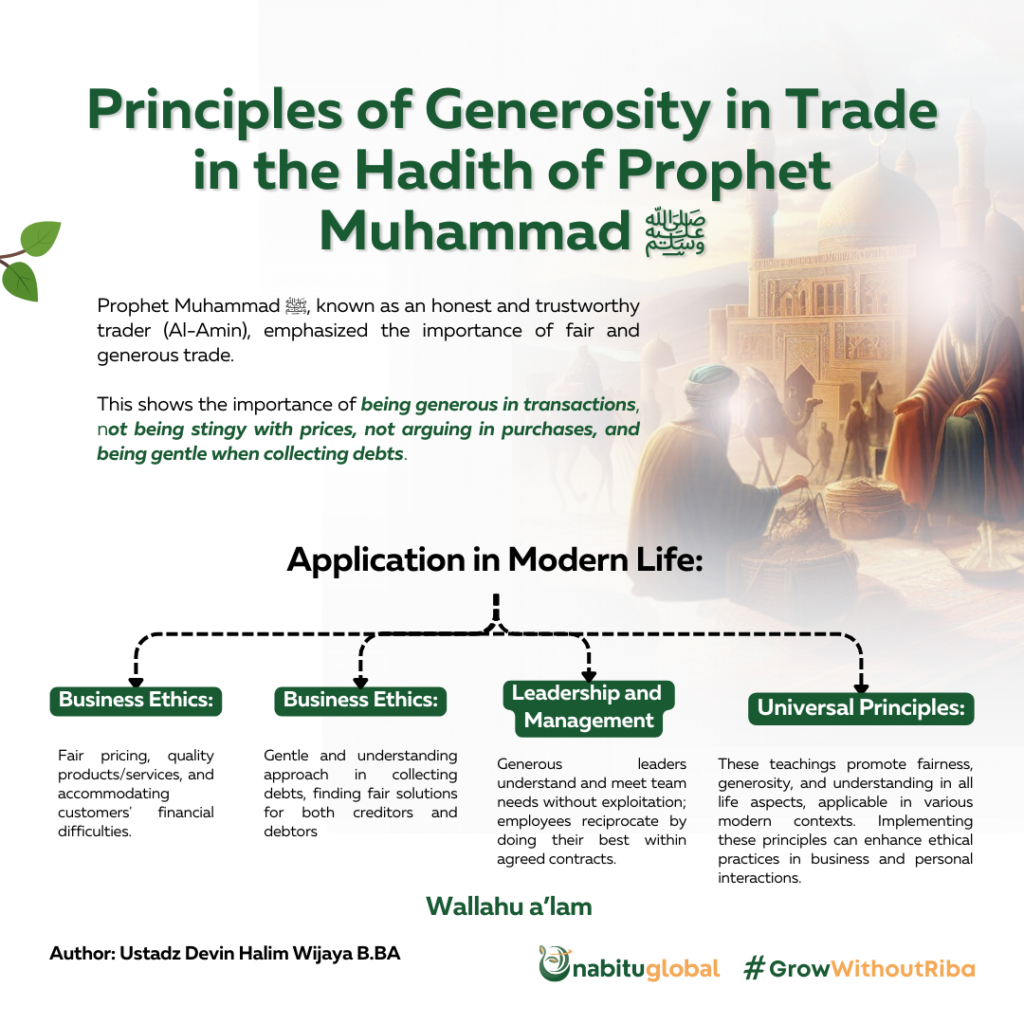Principles of Generosity in Trade in the Hadith of Prophet Muhammad ﷺ
Trade is an essential part of human life. Since the dawn of civilisation, humans have engaged in trade as a way to meet their needs, be it food, clothing, housing, or other goods. Trade also enables the exchange of ideas, cultures, and innovations between different societies.
In the Islamic context, trade has a very important place. The Prophet Muhammad ﷺ himself, before becoming an apostle, was known as an honest and trustworthy trader. He often went on trade trips and was known by the nickname ‘Al-Amin’ or ‘the trustworthy one’. This shows how important trade was in the life and teachings of Prophet Muhammad ﷺ.
One of the trading manners taught by the Prophet Muhammad ﷺ is to be generous and tolerable in trade. This is certainly in line with the spirit of brotherhood and noble morals in Islam. This article will discuss how the Prophet Muhammad ﷺ taught us to make trade easy and the hadiths that explain this.
Trade in the Life of the Prophet Muhammad ﷺ
The Prophet Muhammad ﷺ The Prophet Muhammad ﷺ, before becoming an apostle, was known as an honest and trusted trader. The Prophet Muhammad ﷺ traded with As-Saib bin Abus-Saib who was the best partner, never cheated each other and never disagreed with each other.
The Prophet Muhammad ﷺ started working when he was very young. While living with his uncle Abu Talib, the Prophet was able to earn his own money by herding the goats of the people of Mecca for a few qiraat. The Prophet began to learn to trade when he was 12 years old, his uncle took him to the country of Sham to join the trade. In trading, the prophet was known for his trustworthiness and honesty.
Hadith of the Prophet Muhammad ﷺ about making trade easier and tolerable
The Prophet Muhammad ﷺ himself recommended making trade easy in the following hadith:
عن جابر رضي الله عنه : أن رسول الله صلى الله عليه وسلم قال: «رحِم الله رَجُلا سَمْحَا إذا باع، وإذا اشترى، وإذا اقْتَضَى
Jābir Radhiyallahu anhu reported that the Messenger of Allah (may Allah’s peace and blessings be upon him) said: ‘Allah has mercy on the one who is generous when he sells, buys, and collects (debts).
This is a supplication from the Prophet Muhammad ﷺ asking for mercy for all those who are generous in buying, selling and collecting debts, whether they are men or women.
This hadith explains that in the context of selling, Allah ﷻ will have mercy on someone who is generous. A generous person makes it easy to sell so that he is not stingy with the buyer in terms of price, rather, he reduces the price. When buying, a generous person does not argue and ask for a discount, but he is easy and generous. And when collecting a debt, a generous person makes it easy when collecting a debt from someone who owes him. He asks for it with gentleness, not with violence.
Application of This Hadith in Modern Life
This hadith is highly relevant and applicable to modern life, especially in the context of business and economics. Here are some of the applications:
- Business Ethics: This hadith teaches us to be fair and generous in our dealings. In the modern business world, this could mean giving customers fair prices, not exploiting them, and providing the best quality products or services. Also, if a customer has problems paying, a generous merchant will make allowances and not pressure the customer. As for the customers, they also do not bargain too tightly and pay on time and do not ask for conditions that are too difficult for the seller.
- Debt Management: In the context of debt management, this hadith teaches us to be gentle and understanding when collecting debts. This is especially relevant in the modern era where many people and companies have debts. For example, if a person or company is experiencing financial difficulties, a generous creditor will make allowances and find a solution that is fair to both parties. On the other hand, the debtor should also make every effort to repay the debt to the creditor, which is also an application of this hadith.
- Leadership and Management: This hadith can also be applied in the context of leadership and management. A generous leader or manager will always endeavour to understand and fulfil the needs of his team members, and will not exploit them. Meanwhile, the employees under him will also try to do their best as long as it is in accordance with the agreed work contract.

Overall, this hadith teaches us to always be fair, generous, and understanding in all aspects of life, including in the modern context. These are principles that are universal and can be applied in various situations and contexts. May Allah ﷻ make it easier for us to put this hadith into practice in our lives.
Wallahu a’lam
References
- Islampos. (n.d.). Perjalanan Bisnis Rasulullah, Muhammad Shallallahu alaihi wa sallam Sang Entreuprener3.
- Republika Online. (2019). Perdagangan dalam Ajaran Islam1.
- Republika Online. (n.d.). Jejak Dagang Rasulullah SAW2.
- DalamIslam.com. (n.d.). 4 Prinsip Rasulullah dalam Berdagang4.
- Hadis: Allah merahmati seseorang yang bermurah hati jika ia menjual, membeli, dan menagih (utang). (n.d.). Ensiklopedia Terjemahan Hadis-Hadis Nabi. https://hadeethenc.com/id/browse/hadith/3716







